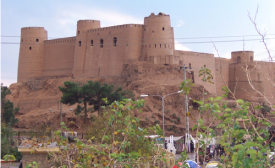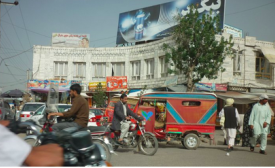afghanistan
At the risk of stating the obvious, Afghanistan is in disarray. The only way out of this miserable situation is for a miracle to happen. After all, philosopher David Hume told us that miracles are not logically impossible. The situation as bad as it seems can be reversed, however—only with a continued American military presence, financial assistance, and solid Afghan leadership will the country succeed.

At the risk of stating the obvious, Afghanistan is in disarray. The only way out of this miserable situation is for a miracle to happen. After all, philosopher David Hume told us that miracles are not logically impossible. The situation as bad as it seems can be reversed, however—only with a continued American military presence, financial assistance, and solid Afghan leadership will the country succeed. Afghans understand how important the U.S.
I probably missed this while I was away, but the LA Times catches me up this morning: U.S. intelligence agencies warn in a new, classified assessment that insurgents could quickly regain control of key areas of Afghanistan and threaten the capital as soon as 2015 if American troops are fully withdrawn next year, according to two officials familiar with the findings.
American-style debates, polling and current affairs programming are bringing a whole new level of political punditry to Afghanistan as the country prepares to elect a new president. Campaign managers, TV producers and pollsters are hot commodities in Kabul as live "town halls" and meet-and-greet interviews aimed at driving the democratic debate forward are getting more attention than ever before.
Right after I graduated from college this past May, I went on a bit of an odyssey. I took a trip to Afghanistan. After being away for three years, I returned to the western part of the country where my family resides. I was struck by how much things had changed for the worse in just three years. Three years ago, there was a lot of employment, a lot of optimism for the future, and an overall hope for a better life. However, this time, complete hopelessness, lawlessness, and uncertainty dominated the atmosphere.

Right after I graduated from college this past May, I went on a bit of an odyssey. I took a trip to Afghanistan. After being away for three years, I returned to the western part of the country where my family resides. I was struck by how much things had changed for the worse in just three years. Three years ago, there was a lot of employment, a lot of optimism for the future, and an overall hope for a better life. However, this time, complete hopelessness, lawlessness, and uncertainty dominated the atmosphere. Everyone lived in a state of utter fear.
World attention today is keenly focused on nuclear proliferation in Iran, the future force presence in Afghanistan, and percolating problems between China and Japan involving islands in the East China Sea. And while officials in Washington deliberate how U.S. influence can affect these potentially destabilizing flash points, they're overlooking a country that could be a key contributor toward steadying the ship: India.
After 12 years, nearly $700 billion, and more than 2,000 dead U.S. soldiers, here's what the United States has to show for its efforts in Afghanistan: a government that's perceived to be as corrupt as North Korea, according to a new report from the anti-corruption group Transparency International. File it away under things U.S. officials would probably rather ignore.







